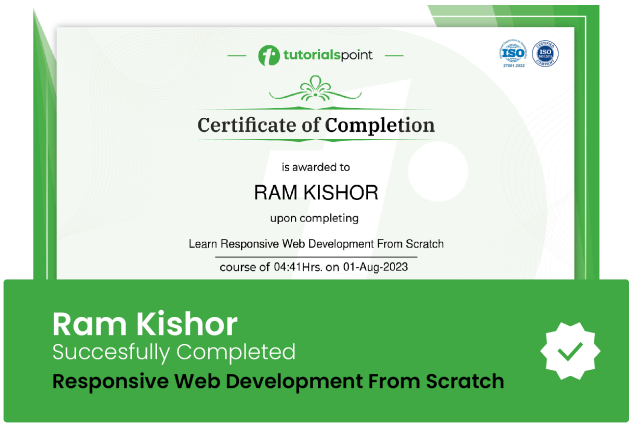Systemic Design of (team) Workshops
Learn the conception, design and holding of (team) workshops with the systemic approach!

Lectures -93
Resources -9
Duration -5 hours

30-days Money-Back Guarantee
Get your team access to 10000+ top Tutorials Point courses anytime, anywhere.
Course Description
Would you like to improve your skills as a (future) manager in terms of lectures and workshops? This course is up to date with the systemic approach and gives you the necessary background knowledge so that you can get started with your own projects right away.
The target group is (future) managers, project managers, people in leading positions, or simply all people with responsibility in their jobs.
I have included scientific content and my own experience as a trainer, coach, and manager in these lessons. This will give you a good overview of the most important tools and methods in holding workshops to develop and consolidate your professionalism.
In this course we will deal with the following contents:
Workshop: In addition to the definition of the different types of presentations, we will discuss the differences between groups and teams. We will also deal with the different occasions. This will give you an overview and you will be able to define the contents precisely in the coming clarification of the assignment. Since you as a consultant often have to do a lot of persuasion for workshops, we will also look at the advantages and arguments for workshops. This will be followed by a discussion of the differences in presentation and moderation in general. At the end of this chapter we will work on the skills of a moderator, so that you can reflect on your own.
Systemic consulting: An essential feature of this online course is the link to the systemic approach. We start with a definition and an overview of the topic. You will learn about constructivism, which is one of the main pillars of the systemic approach. We also cover psychoanalytical perspectives to give you a basic understanding of transference and countertransference. We will take a look at the facilitation process and the emotional phases in change processes. With this model you can use workshops to provide information for diagnosis and at the same time implement group work.
The conception of workshops: In this video series, the first thing to do is to discuss the main tasks of moderation. We will talk briefly about the didactic material and how you can make chairs in your seminar rooms. It continues with work orders and how you can control group work. Afterwards we will go straight into the subject matter, namely the different types of workshop. I will show you an excerpt, which, in my experience, are the most common. I will briefly go into the six workshops shown and explain their basic orientation.
Participatory involvement: As a manager, you will often accompany employees on their way and may already have learned to appreciate the participatory approach. In addition, you will learn the basic building blocks of participatory participation. In this context, I will show you different ways of working together and also discuss the advantages and disadvantages. Often you will integrate all variants in one workshop, so that you get a wide range of variety and interpretation in your workshop.
Workshop Design: This chapter is intended to give you a rough overview of how to design workshops. We start with a rough overview and go into detail. With this basis, you can then fully design the order clarification, which we will discuss afterwards. This also includes a clear and well-formulated definition of objectives, because only if you know when a workshop is successful you can be successful. Accordingly, we will also look at some sample formulations in the course.
Examples of interventions: In this chapter I will show you the best and fastest interventions to be implemented in workshops. Most of them come from systemic coaching, which I have adapted for the workshop concept. Basically a simple and subtle approach, but where we always focus on output and information gathering, so that we generate real added value. So you should be sufficiently prepared for your first workshop.
Team development: In this chapter we first discuss what makes good teams. In return, we will also take a critical look at teams. We will then look at the different occasions for team coaching so that you can implement the different approaches in your workshop architecture. An essential core element of this chapter are the development phases in teams. You will also become familiar with the concept of team roles. This will provide you with two comprehensive methods to help you diagnose and implement them. We will then devote ourselves to an extensive case study - a practical example from my experience. Together with you, I will go through the most important steps in the conceptual design from the initial situation to the implementation and tell you about my thoughts and ideas for implementation.
Conflicts in teams: Sooner or later you will be confronted with conflicts in your work as a manager/moderator/consultant. Whether in a small circle during a workshop or as a conflict workshop. In this short video series I will go into the definition, because meaning and types of conflicts. The causes of conflicts will help you to sharpen your understanding of the diagnosis of conflicts and to start appropriate interventions. Furthermore, the systemic view on conflicts helps you to follow and try out a solution- and resource-oriented approach. We will round off this chapter with the escalation steps and at the end I will briefly discuss how to deal with conflicts.
With this online course you get recommendations for your own workshop design which you can implement for your own company.
Secure your knowledge advantage now and enroll in this course right now.
I look forward to seeing you in the course.
Best regards
Markus Edenhauser, MA MSc
Who this course is for:
- People who conceive and/or hold lectures and workshops.
Goals
What will you learn in this course:
Professional background knowledge and tools for the first workshops
Conception of workshops
Linking systemic counselling in workshops
Planning and controlling participation involvment
Overview and creation of workshop designs
Examples of interventions
Team development as a separate chapter
Identifying and intervening conflicts in teams (separate chapter)
Case study and recommendations for action
Prerequisites
What are the prerequisites for this course?
Openness and courage to try new things

Curriculum
Check out the detailed breakdown of what’s inside the course
Introduction
3 Lectures
-
May I introduce myself 01:51 01:51
-
Prerequisite 03:13 03:13
-
Expectations 00:32 00:32
Workshop
9 Lectures

Systemic Consulting
9 Lectures

Conception of workshops
13 Lectures

Participatory Involvement
10 Lectures

Workshop Design
10 Lectures

Examples of Interventions
11 Lectures

Team development
18 Lectures

Conflicts in teams
9 Lectures

Conclusion
1 Lectures

Instructor Details

Markus Edenhauser
Bringing IT and People togetherI am Markus Edenhauser from Austria/Tyrol. I have professional experience in electrical engineering & finance industry as well as in the non-profit sector. My experiences range from IT auditor and trainer for it-topics, head of department for finance and technology to personnel management. Nowadays I develop funny things with microcontrollers for IoT devices #smarthome.
Education: Foreman in Electrical Engineering, Train the Trainer and Bachelor & Master degree in Business Informatics and Master degree in Coaching, Organizational & Human Resources Development.
I am looking forward to welcoming you in my courses.
pixelEDI
Course Certificate
Use your certificate to make a career change or to advance in your current career.

Our students work
with the Best


































Related Video Courses
View MoreAnnual Membership
Become a valued member of Tutorials Point and enjoy unlimited access to our vast library of top-rated Video Courses
Subscribe now
Online Certifications
Master prominent technologies at full length and become a valued certified professional.
Explore Now


 Updated on Apr, 2024
Updated on Apr, 2024
 Language - English
Language - English